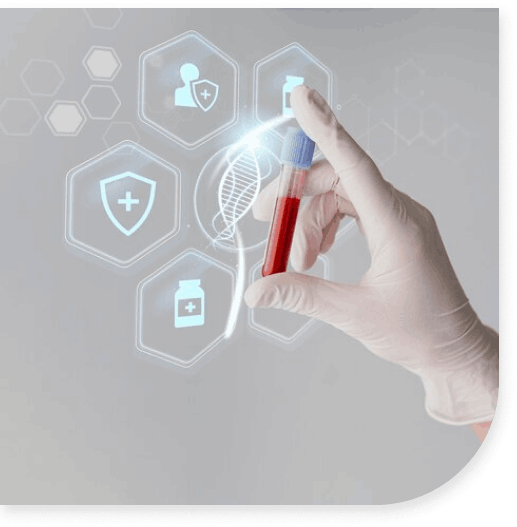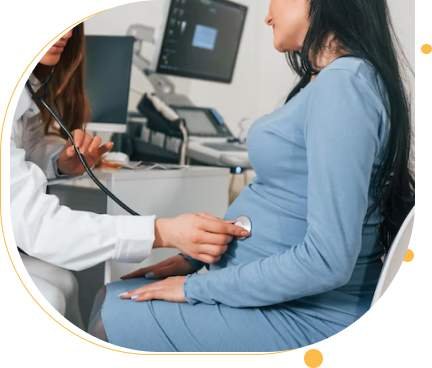Fetomat Wellness: The Best IVF Clinic in Kolkata
What is IVF treatment?
Who does IVF Treatment benefit?
Women who have
- Two blocked or damaged fallopian tubes
- Endometriosis, a tissue similar to the uterus lining grows outside the uterus
- No ovaries or no eggs in the ovaries
- Suffered from Recurrent Miscarriages
Men who have
- Low sperm count
- Low sperm motility
- Abnormal sperm
Couples who have
- History of genetic disorders
- Unexplained infertility


Diagnosis Of Men Infertility
In the best infertility clinic in Kolkata, both partners are evaluated through detailed medical history and physical exams, supported by laboratory and sonographic evaluation.
Fertility Tests For Men In Kolkata
Semen Examination
Semen Examination evaluates the quantity and quality of sperm
Hormone Analysis
Hormone Analysis measures the level of male hormones such as testosterone and others.
Testicular Biopsy
In certain instances, a testicular biopsy might be conducted to detect irregularities that play a role in infertility or to gather sperm for procedures aimed at assisted reproduction.
DNA Fragmentation Test
DNA fragmentation is the breakdown of DNA in sperm cells. Several factors, including smoking, infection, and exposure to environmental toxins can cause it. This test determines the level of DNA fragmentation in the male partner.
Imaging Tests
Imaging Tests such as a transrectal or scrotal ultrasound are advised.
Book Your Appointment Today

Diagnosis of Female Infertility
In the best infertility clinic in Kolkata, both partners are evaluated through detailed medical history and physical exams, supported by laboratory and sonographic evaluation.
Fertility Tests For Women In Kolkata
Imaging Tests
Pelvic ultrasounds are key to detecting conditions affecting the uterus, ovaries, and fallopian tubes. This imaging technique evaluates potential eggs or follicles while accompanied by a blood hormone test. For more precise assessments, specialized tests like sonohysterograms are employed. This involves Saline Infusion Sonography (SIS) to examine the uterine cavity and Hystero-contrast Sonography (HyCoSy) to check fallopian tubes – structures not easily visible in standard ultrasounds.
Hormone Testing
These tests are used to evaluate the levels of crucial female hormones required for fertility, alongside thyroid and pituitary hormones that regulate reproductive functions.
Operative Testing
An infertility specialist in Kolkata often employs laparoscopic or hysteroscopic methods to closely scrutinize female pelvic organs for conditions like endometriosis, uterine fibroid, polyp, septum, or ovarian cysts.
Stages of IVF Treatment
Step 1 (Ovarian Stimulation):
A woman usually produces one egg in a normal menstrual cycle. However, for IVF treatment, more than one egg is needed to increase the chances of creating a healthy embryo. To achieve this, we prescribe fertility medications to stimulate your body’s egg production. Follicle Stimulating Hormone (FSH) is commonly used for this purpose, it is injected under the skin to encourage the ovaries to develop multiple follicles, each potentially containing an egg. Additionally, Gonadotropin-Releasing Hormone (GnRH) is frequently used to suppress the secretion of gonadotropins, thereby preventing premature ovulation. Once optimal suppression is achieved, you will receive regular injections of gonadotropins to stimulate the development of multiple follicles.
Step 2 (Monitoring):
The development of follicles is monitored through regular ultrasound imaging and hormone tests. During the stimulation phase, you will undergo ultrasound scans approximately four times over two weeks. These scans and blood tests performed at each visit help assess the number and size of the follicles. This monitoring allows the doctor to determine the best time for egg retrieval and adjust your medication doses as needed to achieve the best possible outcome.
Step 3 (Preparation for Egg Retrieval):
When the lead follicles reach the optimal size of 17–22 mm, the final maturation of the eggs is triggered with an injection of hCG. To prepare for the egg retrieval, this hormonal injection is administered 36 hours before the procedure. The egg retrieval is then performed 34 to 36 hours after the hCG injection.
Step 4 (Egg Collection):
Mature eggs are retrieved 34 to 36 hours after the administration of hCG. This procedure is conducted in a surgical suite, with the help of transvaginal ultrasound guidance, while the patient is under general anaesthesia. The embryologist removes the fluid from each follicle, which usually contains an egg, and places it in a test tube for examination.
Since ultrasound images can only provide an estimate of the number of eggs present, the actual number retrieved can vary—sometimes fewer or more than initially expected. Occasionally, follicles may appear on the ultrasound but yield no eggs during retrieval. If no eggs are obtained, the treatment cycle cannot proceed to the embryo transfer stage. In such cases, you will be given time to discuss with the doctor the available options and next steps.
Step 5 (Fertilisation and Embryo Development):
The eggs are fertilised in the laboratory. If there are concerns about sperm quality, Intracytoplasmic Sperm Injection (ICSI) may be recommended to fertilise the eggs. If sperm quality is sufficient, sperm is added to the culture dish with the eggs, and the dish is incubated overnight to allow for fertilisation.
The following day, the embryologist will assess whether fertilisation has occurred and will continue to monitor the development of the embryos. If more than three well-developed embryos are present, additional embryos may be frozen for potential future use.
Step 6 (Embryo Transfer):
Embryo transfer normally occurs on Day 3 or Day 5 after fertilisation. This procedure is straightforward and does not require general anaesthesia. During the transfer, embryos are loaded into a catheter and guided into the uterus under transabdominal ultrasound guidance. The catheter passes through the cervix to place the embryos.
If successful, implantation generally takes place within six to ten days. Following the transfer, you will be prescribed medications to support the luteal phase and enhance the likelihood of implantation. The number of embryos transferred is adjusted based on factors such as age, embryo quality, and medical history. This approach aims to maximise the chances of success while minimising the risk of multiple pregnancies.
Step 7 (After Transfer):
How to Prepare for IVF Treatment?
Before starting the IVF treatment process, you and your partner will undergo a comprehensive evaluation. This process involves:
Initial Consultation:
Discuss the IVF process, expectations and potential challenges with the doctor.
Medical Assessments:
Including a gynaecological exam, Pap test (if necessary), mammogram (if over 40) and semen analysis.
Infectious Disease Screening:
Testing for STIs and other infectious diseases.
Fertility testing:
Evaluating ovarian reserve, and conducting blood and urine tests.

Genetic testing:
Screening for genetic carrier status.
Procedural preparation:
Learning how to administer fertility medications and signing consent forms.
Uterine evaluation:
Assessing the uterine cavity through hysteroscopy or SIS (Saline-Infusion Sonography).

What Precautions Should Be Taken After IVF Procedure?
It’s generally advisable to avoid strenuous activities, heavy lifting, and any actions that could cause jarring movements during your IVF treatment.
Take all medications prescribed by the doctor, as they are specifically selected to enhance your chances of pregnancy.
Additionally, steer clear of alcohol, smoking, and exposure to X-rays.
What to Expect After the IVF Treatment Process?
After the embryo transfer, you may be advised to rest for the day, although most women can resume normal activities the following day. For 7 to 9 weeks post-transfer, daily injections or pills of the hormone progesterone may be necessary. This hormone helps prepare the uterine lining for embryo implantation and supports the embryo’s growth. Progesterone is often continued for 8 to 12 weeks after pregnancy is confirmed to help prevent miscarriage.
A pregnancy test will be conducted at the clinic approximately 12 to 14 days after the embryo transfer to check for pregnancy. During IVF, you might experience the following after ovulation stimulation, such as:
- Nausea or vomiting
- Headaches or hot flashes
- Enlarged ovaries, abdominal pain, and bruising from injections
- Breast tenderness, bloating, spotting, constipation, and cramping
Positive Pregnancy Test
After a frozen embryo transfer, you will need to wait about 15 days before taking a pregnancy test. The doctor will arrange a blood test to confirm pregnancy. If the test is positive, it means the IVF process was successful.
You will continue to be monitored by the fertility clinic through ultrasounds and blood tests until you reach 8 to 10 weeks of pregnancy. After this period, you will transition to a regular OB-GYN for ongoing prenatal care.
Negative Pregnancy Test
If the test result is negative, our medical team will provide support and understanding during this difficult time. Many couples experience a failed embryo transfer before achieving success in a later cycle.
Lean on supportive friends and family throughout your journey, as fertility treatments often involve emotional ups and downs. A negative result doesn’t mean the end of your journey. Our medical specialist will offer guidance on the next steps, which could include exploring other fertility options or starting another IVF cycle.

What Are the Advantages of the IVF Procedure?
IVF success rates are higher in comparison to other infertility treatments due to the following benefits.
IVF is often recommended when other infertility treatments have not been successful. It is particularly effective for conditions such as blocked fallopian tubes, severe male infertility, low ovarian reserves, or advanced maternal age (generally women over 38).
In some cases, fertility specialists may suggest using donor eggs and/or sperm, which can enhance your chances of pregnancy, often within the first or second IVF cycle.
By cryopreserving eggs or embryos, you can choose the timing for conception and childbirth, allowing you to plan your family according to your needs.
Preimplantation genetic testing (PGT) can be performed on embryos before transfer, helping to ensure they are free from known genetic disorders such as Down syndrome and sickle cell anaemia. This technology significantly increases the likelihood of a healthy birth.

Cost of IVF Treatment in Kolkata
- Specialist consultations
- Laboratory tests
- Medications
- Egg retrieval procedures
- Sperm preparation
- Anaesthesia
- Embryo storage
- Preimplantation genetic screening
- Intracytoplasmic sperm injection (ICSI), if chosen
- Health insurance coverage
Is IVF the First Line for Fertility Treatment?
IVF often requires more than one cycle if the initial round of fertilisation or implantation does not succeed. Additionally, the cost of the entire process is an important factor to consider when deciding whether to proceed with IVF.

Frequently Asked Questions (FAQs)
What factors influence IVF success rate?
IVF success rates are influenced by factors such as age, egg quality, sperm quality, and the cause of infertility. The clinic’s experience and technology also play a significant role.
Is IVF pregnancy safe?
IVF pregnancies are generally safe, but they can carry risks such as multiple pregnancies.
Can I get twins with IVF?
Yes, IVF can result in twins or higher-order multiples, especially if more than one embryo is transferred. The number of embryos transferred is usually discussed to balance success rates and risks.
Is IVF the right fertility treatment?
IVF is often recommended when other treatments have failed or when specific infertility issues are present. It’s important to consult a specialist to determine if it’s the best option for your situation.
Can IVF mothers have a normal delivery?
Yes, many women who conceive through IVF have normal deliveries. The delivery method depends on individual health factors and circumstances during pregnancy.
Can IVF be successful in the first attempt?
Yes, IVF can be successful on the first attempt, though success rates vary based on individual factors like age and the cause of infertility.
Is the IVF treatment process painful?
IVF involves some discomfort, primarily from hormone injections and egg retrieval. However, pain is generally manageable with medications and anaesthesia.
Is there an age limit for IVF treatment?
While there is no strict age limit, IVF success rates decline with age, particularly after 40.
